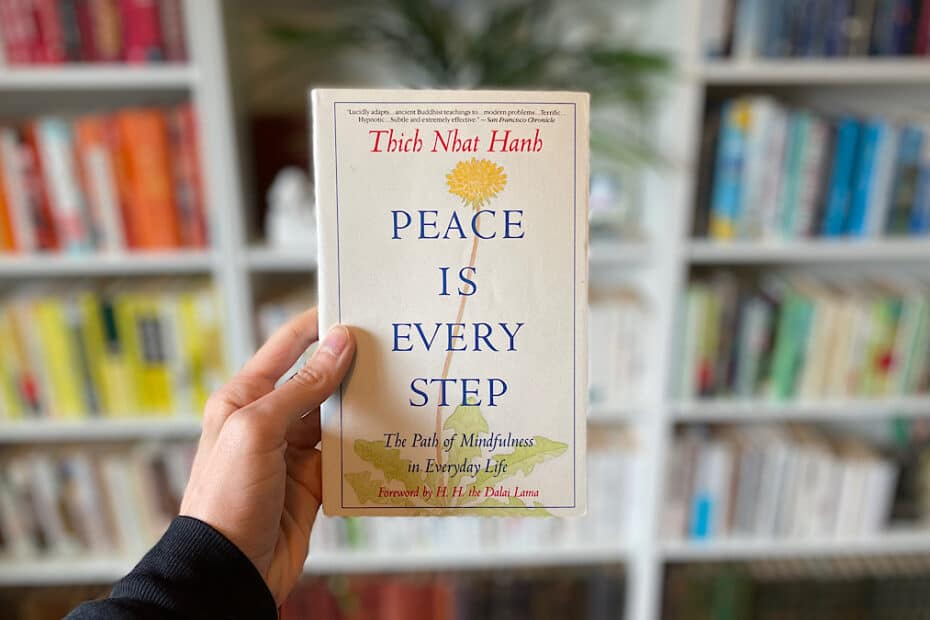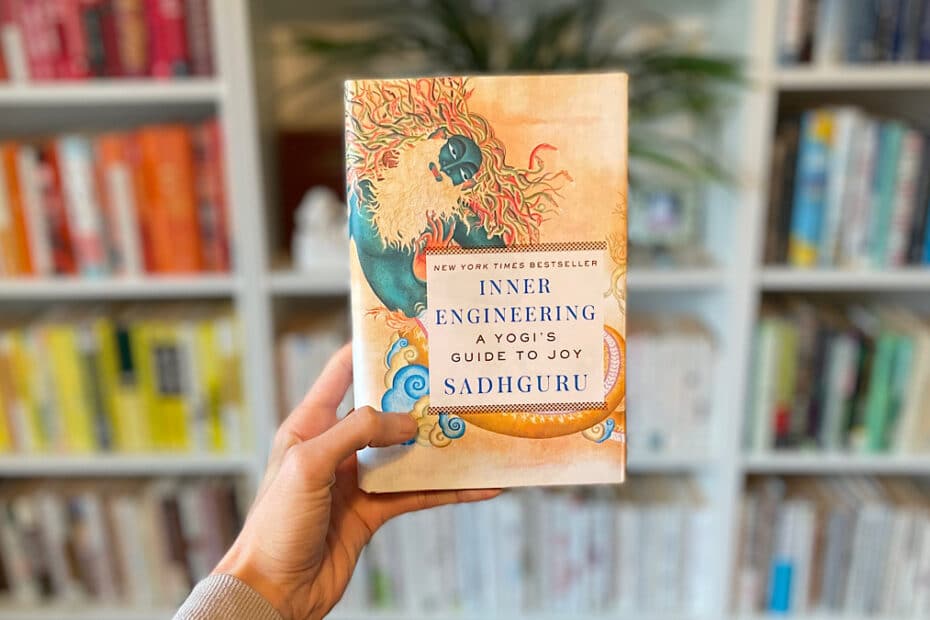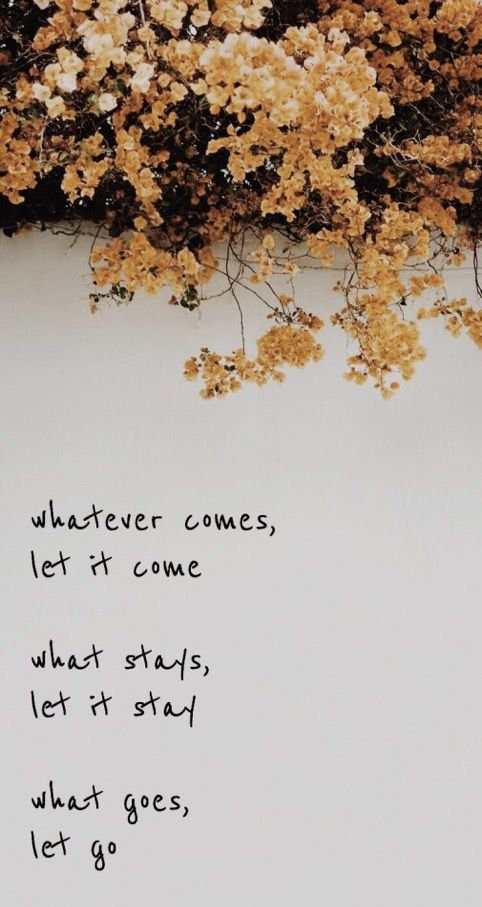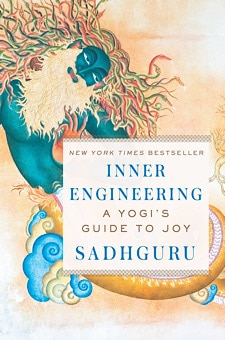“Have you ever sat very quietly without any movement? You try it, sit really still, with your back straight, and observe what your mind is doing. Don’t try to control it, don’t say it should not jump from one thought to another, but just be aware of how your mind is jumping. Don’t do anything about it, but watch it as from the banks of a river you watch the river flow by. In the flowing river there are so many things—fishes, leaves, dead animals—but it is always living, moving, and your mind is like that. It is everlastingly restless, flitting from one thing to another like a butterfly… just watch your mind. It is great fun. If you try it as fun, as an amusing thing, you will find that the mind begins to settle down without any effort on your part to control it. There is then no censor, no judge, no evaluator; and when the mind is thus very quiet of itself, spontaneously still, you will discover what it is to be gay. Do you know what gaiety is? It is just to laugh, to take delight in anything or nothing, to know the joy of living, smiling, looking straight into the face of another without any sense of fear.”
J. Krishnamurti, Think On These Things, via Sunbeams (Page 41)
“…You are no longer Buddhist or a Hindu or a Christian or a Jew or a Moslem. You are love, you are truth. And love and truth have no form. They flow into forms. But the word is never the same as that which the word connotes. The word ‘God’ is not God, the word ‘Mother’ is not Mother, the word ‘Self’ is not Self, the word ‘moment’ is not the moment. All of these words are empty. We’re playing at the level of intellect, feeding that thing in us that keeps wanting to understand. And here we are, all the words we’ve said are gone. Where did they go? Do you remember them all? Empty, empty. If you heard them, you are at this moment empty. You’re ready for the next word. And the word will go through you. You don’t have to know anything: that’s what’s so funny about it. You get so simple. You’re empty. You know nothing. You simply are wisdom—not becoming anything, just being everything.”
Ram Dass, Sunbeams (Page 25)
“I have made a great discovery. I no longer believe in anything… It is not the object that matters to me but what is between them: it is this ‘in-between’ that is the real subject of my pictures. When one reaches this state of harmony between things and one’s self, one reaches… a state of perfect freedom and peace—which makes everything possible and right. Life then becomes perpetual revelation.”
George Braque, Sunbeams (Page 24)
“We spend most of our time and energy in a kind of horizontal thinking. We move along the surface of things going from one quick base to another, often with a frenzy that wears us out. We collect data, things, people, ideas, ‘profound experiences,’ never penetrating any of them… But there are other times. There are times when we stop. We sit still. We lose ourselves in a pile of leaves or its memory. We listen and breezes from a whole other world begin to whisper. Then we begin our ‘going down.'”
James Carroll, Sunbeams (Page 22)
“It is the same when Siddhartha has an aim, a goal. Siddhartha does nothing; he waits, he thinks, he fasts, but he goes through the affairs of the world like the stone through the water, without doing anything, without bestirring himself; he is drawn and lets himself fall.”
Hermann Hesse, Siddhartha, via Sunbeams (Page 11)
“You try being alone, without any form of distraction, and you will see how quickly you want to get away from yourself and forget what you are. That is why this enormous structure of professional amusement, of automated distraction, is so prominent a part of what we call civilization. If you observe, you will see that people the world over are becoming more and more distracted, increasingly sophisticated and worldly. The multiplication of pleasures, the innumerable books that are being published, the newspaper pages filled with sporting events—surely, all these indicate that we constantly want to be amused. Because we are inwardly empty, dull, mediocre, we use our relationships and our social reforms as a means of escaping from ourselves. I wonder if you have noticed how lonely most people are? And to escape from loneliness we run to temples, churches, or mosques, we dress up and attend social functions, we watch television, listen to the radio, read, and so on… If you inquire a little into boredom you will find that the cause of it is loneliness. It is in order to escape from loneliness that we want to be together, we want to be entertained, to have distractions of every kind: gurus, religious ceremonies, prayers, or the latest novel. Being inwardly lonely we become mere spectators in life; and we can be the players only when we understand loneliness and go beyond it… because beyond it lies the real treasure.”
J. Krishnamurti, Think On These Things, via Sunbeams (Page 3)
20 Profound Thich Nhat Hanh Quotes from Peace Is Every Step
Excerpt: In the rush of life, we tend to lose touch with the peace that is available in each moment. These quotes from Peace Is Every Step will help…
Read More »20 Profound Thich Nhat Hanh Quotes from Peace Is Every Step
“Meditation should be an inner shelter, an inner shrine. Whenever you feel that the world is too much for you, you can move into your shrine. You can have a bath in your inner being. You can rejuvenate yourself. You can come out resurrected; again alive, fresh, young, renewed… to live, to be. But you should also be capable of loving people and facing problems, because a silence that is impotent and cannot face problems is not much of a silence, is not worth much.”
Osho, Courage (Page 160)
“If a man knows what peace is, and what mind is, he cannot write a book entitled Peace of Mind, because mind is the cause of all unpeace, all restlessness. Peace is when there is no mind.”
Osho, Courage (Page 45)
“Looking at a flower, become the flower; dance around the flower, sing a song. the wind is cool and crisp, the sun is warm, and the flower is in its prime. The flower is dancing in the wind, rejoicing, singing a song, singing alleluia. Participate with it! Drop indifference, objectivity, detachment. Drop all your scientific attitudes. Become a little more fluid, more melting, more merging. Let the flower speak to your heart, let the flower enter your being. Invite him—he is a guest! And then you will have some taste of mystery.”
Osho, Courage (Page 21)
“You were born as a no-mind. Let this sink into your heart as deeply as possible because through that, a door opens. If you were born as a no-mind, then the mind is just a social product. It is nothing natural, it is cultivated. It has been put together on top of you. Deep down you are still free, you can get out of it. One can never get out of nature, but one can get out of the artificial any moment one decides to.”
Osho, Courage (Page 16)
30 Sadhguru Quotes from Inner Engineering on Spirituality, Love, and Understanding Life
Excerpt: Learn how to better engineer the inner workings of your life by reading this powerful collection of Sadhguru quotes from Inner Engineering…
Read More »30 Sadhguru Quotes from Inner Engineering on Spirituality, Love, and Understanding Life
“If you have a good seed and if you create the right atmosphere, it will sprout. Creating the right atmosphere of body and mind is the only work. You do not have to do anything else. No teachings of morality, no metaphysical discourses are needed. If your humanity is stirred, you are a beautiful human being.”
Sadhguru, Inner Engineering (Page 187)
“Do you want to be a living being or a thinking being? Right now, ninety percent of the time, you are only thinking about life, not living it. Have you come into this world to experience life or to think about it? Your mental process is a very small happening compared to the life process, but right now it has become far more important. It is time for humanity to shift the significance to the life process once again. The need is an urgent one. Our lives depend on it.”
Sadhguru, Inner Engineering (Page 162)
Inner Engineering: A Yogi’s Guide To Joy [Book]
Book Overview: A yogi lives life in this expansive state, and in this transformative book Sadhguru tells the story of his own awakening, from a boy with an unusual affinity for the natural world to a young daredevil who crossed the Indian continent on his motorcycle. Today, as the founder of Isha, an organization devoted to humanitarian causes, he lights the path for millions. The term guru, he notes, means “dispeller of darkness, someone who opens the door for you. . . . As a guru, I have no doctrine to teach, no philosophy to impart, no belief to propagate. And that is because the only solution for all the ills that plague humanity is self-transformation. Self-transformation means that nothing of the old remains. It is a dimensional shift in the way you perceive and experience life.” The wisdom distilled in this accessible, profound, and engaging book offers readers time-tested tools that are fresh, alive, and radiantly new. Inner Engineering presents a revolutionary way of thinking about our agency and our humanity and the opportunity to achieve nothing less than a life of joy.
Buy from Amazon! Listen on Audible!
Great on Kindle. Great Experience. Great Value. The Kindle edition of this book comes highly recommended on Amazon.
Post(s) Inspired by This Book:
- 30 Sadhguru Quotes from Inner Engineering on Spirituality, Love, and Understanding Life
- Sadhguru on How the Whole Of Human Experience Is Self-Created (and How To Take Better Control of Your Experience) [Excerpt]
- Listen As Two WWII Vets Describe How The Potency Of Life Can Be Best Felt When Closest To Death [Excerpt]
- Sadhguru Quote on Transforming The World and Where To Focus Your Efforts First (Beyond the Quote 300/365)
- Sadhguru Quote on Priorities and How Discovering Your “Everest” Will Change Your Life (Beyond the Quote 298/365)
- Sadhguru Quote on Love and How It Has Nothing To Do With Someone Else (Beyond the Quote 290/365)
“Enlightenment is the space between your thoughts.”
Naval Ravikant, Medium
Thich Nhat Hanh Quote on the Present Moment and Appreciating the Flower When It’s Shown To You
“We can realize peace right in the present moment with our look, our smile, our words, and our actions. Peace work is not a means. Each step we make should be peace. Each step we make should be joy. Each step we make should be happiness. If we are determined, we can do it. We don’t need the future. We can smile and relax. Everything we want is right here in the present moment.”
Thich Nhat Hanh, Peace is Every Step
Beyond the Quote (238/365)
One day the Buddha held up a flower in front of an audience of 1,250 monks and nuns. He did not say anything for quite a long time. The audience was perfectly silent. Everyone seemed to be thinking hard, trying to see the meaning behind the Buddha’s gesture. Then, suddenly, the Buddha smiled.
Read More »Thich Nhat Hanh Quote on the Present Moment and Appreciating the Flower When It’s Shown To YouTerri Guillemets Quote on Clouds and What They Can Remind Us About Life
“Why do I love clouds? Because you can’t save a cloud like you can save a leaf or a flower or a rock – clouds are now.”
Terri Guillemets
Beyond the Quote (204/365)
As I sit here struggling to find the right words to write, I find myself looking out the window, captivated by the movement of the clouds through the sky. It’s nothing special. Or it’s something really special? I can’t tell.
Read More »Terri Guillemets Quote on Clouds and What They Can Remind Us About LifeDon’t Confuse The Pointing Finger With What’s Being Pointed At — On Understanding Words
Introduction: Fetch Me The Moon—A Short Zen Story
The Zen teacher’s dog loved his evening romp with his master. The dog would bound ahead to fetch a stick, then run back, wag his tail, and wait for the next game. On this particular evening, the teacher invited one of his brightest students to join him—a boy so intelligent that he became troubled by the contradictions in Buddhist doctrine.
Read More »Don’t Confuse The Pointing Finger With What’s Being Pointed At — On Understanding Words


